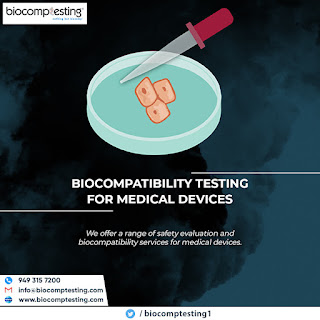Reduce Chance Of Adverse Reactions From Medical Devices Through Biocompatibility Tests
Medical devices require stringent
biocompatibility testing to ensure it does not cause any adverse reactions and
immune reaction on the human tissues. All the medical devices require mandatory
biocompatibility testing to reduce any adverse physiological reactions and
risk. ISO 10993 is considered as standard by most of the regulatory bodies.
Ø
Importance
of Biocompatibility Testing for the Devices
The biocompatibility
testing for medical devices is critical to determine the safety of the
use of the device on human tissues or skin. The devices come in direct contact
with the skin and hence if it is tested for biocompatibility, it can trigger
reactions and adverse impact.
·
With the biocompatibility test, it helps in
identifying whether a particular device is safe for use on human system or not
and hence eliminates risk of toxicity or immune rejection. In case, it is not
compatible, it can cause irritability.
·
The professional companies that provide the
biocompatibility tests follow standard protocols to test the medical device.
For any medical device to get approval and reach the market for use, it has to
go through regulatory approvals.
·
The testing service providers have updated
knowledge and information about all the latest and standard regulatory. This
helps in following the standard rules and regulatory requirement for the
testing.
The biocompatibility
testing ISO 10993 is the standard mark which is accepted and required
by regulatory bodies like FDA and CE marking. A precise and innovative step by
step approach is used to conduct the comprehensive biocompatibility testing.
The best in class testing facility helps in accurate testing followed by
complete report.
Ø
Biocompatibility
Test and Complete Reporting on the Analysis
Not only is the testing necessary after
the manufacturing and designing of the medical devices but even during the
prototyping. The standard biocompatibility tests are necessary for the overall
development of the medical devices and it is done as per the requirement of the
client or the regulatory standards.
After the tests have been conducted, a
detailed report is provided in written document form for submission to the
clients. For the application of the approval of the medical device, it is
mandatory for the manufacturer to provide all the details of compatibility
testing, results, and related requirements.
There are different types of test
which are used identifying any potential threats. Some of the test category
includes tests for cytotoxicity, irritation, hemocompatibility, sub-chronic toxicity,
sensitization, genetic toxicity, implantation etc. The test can be conducted on
devices used for various medical related areas.
Ø
Finding
the Right Testing Service Provider for the Biocompatibility Test
Always make sure that you approach a
genuine company or service provider for conducting all the necessary tests. The
service provider must have the right accreditation from the regulatory bodies
and have GLP certification. This ensures the test is genuine and done in
authentic manner.
The labs must be built with
state-of-the-art infrastructure and facility so that all the standards test can
be conducted. The team must be high professional and provide with all necessary
data and information related to the conductance of the test.



Comments
Post a Comment